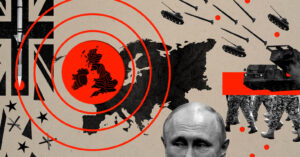Ukraine’s counteroffensive has stalled, and Vladimir Putin is once again blustering as if Russia were a first-rate power. The problem, paradoxically, is that it is not. The damage his country has sustained throughout the course of the Ukraine war has been substantial. Russia has lost 2,200 of its 3,500 tanks in Ukraine, and 315,000 out of 360,000 troops, forcing them to launch recruitment campaigns and raid the prison system. And even if, on full war-footing, it currently looks like it could force Ukraine into accepting that large swaths of its territory will remain under occupation for the foreseeable future, Russia itself has been substantially weakened.
Over time, a weakened Russia will likely be a harbinger of chaos across its periphery. Empires since antiquity have provided a solution to chaos. But empires, as they collapse, leave chaos in their wake. History has provided no solution to this conundrum.
The pattern is usually the same. An imperial hegemon cobbles together a domain of many ethnic groups, forcing them to lay down their arms against each other. An empire may last hundreds of years and yet build nothing except a tenuous inter-ethnic truce. This has been the story of the Russian Empire and its shadow zones in the Caucasus, the Balkans, stretches of Central and Eastern Europe, not to mention stretches of Siberia and the Far East. But as the hegemon weakens, fights for control of territory between one group and another commence.
The case of Nagorno-Karabakh in the Caucasus is the most telling. Stalin put this ethnic-Armenian enclave inside Azerbaijan for the same reason he burdened other Soviet republics with large ethnic minorities: to make it impossible for any of them to secede from the Soviet Union without inter-ethnic war tearing them apart. Fighting between the Armenians and the Azerbaijanis (Azeri Turks) began following the weakening of the Soviet Union in the late-Eighties under the rule of Mikhail Gorbachev, leaving the Armenians in control of Nagorno-Karabakh. Since then, Armenia has looked to Russia as a patron who could not only keep the regional peace, but also keep their ethnic compatriots in place.
But sensing Russia’s growing weakness, the Azerbaijanis took back the enclave last year by force of arms. The President, Ilham Aliyev, provided assurances over the decades that he had no aggressive intentions. But, having built up his armed forces with money afforded by massive oil revenues, and sensing an opportunity provided by Russia’s distraction in Ukraine, he pounced. Next, Aliyev may send his soldiers across southern Armenia to link up with the ethnic-Azeri enclave of Nakhichevan, bordering Iran. Or, he will use the implicit threat of doing so to extract a corridor-of-sorts through negotiation.
Meanwhile, in the Balkans, violence flared not that long ago between masked Serbian gunmen in the north of Kosovo, home to a large Serbian minority, and Kosovar Albanian police. The Kosovars blame organised criminal elements supported by neighbouring Serbia for the attacks, while authorities in Belgrade struggled to deny their involvement.
Throughout his time in power, the Serbian President, Aleksandar Vucic, has played a delicate game, serving in turns as an ethnic arsonist and quickly thereafter offering himself up to European interlocutors as a firefighter. But while he seems to have pulled off the same trick this time, Vucic, or someone even more extreme in his government, may judge that a Nagorno-Karabakh moment could be within reach for Serbia, and that it would be in their interest to more thoroughly stoke the flames of war in the region. And, should open conflict between “breakaway” Serbs in Kosovo, Bosnia or Montenegro force the redrawing of borders once again in the Balkans, it’s not clear where that trend would stop.
All this may just be a prologue for trouble across the longitudes of the Russian empire and its shadow zones from Europe to Asia, a curtain-raiser for ugly unrest elsewhere. Just as Aliyev smelled the Kremlin’s relative weakness as he moved into Nagorno-Karabakh, others might act similarly, motivated as they are by separatist tendencies.
Indeed, small Albanian minorities are to be found in Serbia and Greece, with a much more significant number of ethnic Albanians clustered in the west and northwest of North Macedonia, bordering Albania itself. Demographically speaking, a greater Albania already exists glaringly on the map, and this is why the western Balkans are so ripe for Russian meddling, which is what declining empires do in order to throw their weight around.
A Russian attempt to further undermine the already weak state of Moldova could also ignite a few irredentist voices in Romania, who may ultimately want a union with this largely Romanian-speaking territory formerly known as Bessarabia. In Moldova, there is already measurable support for a greater Romania. At the same time, Hungarian Prime Minister Viktor Orbán is fixated on the massive loss of territory in all directions inflicted on the Kingdom of Hungary by the post-First World War Treaty of Trianon. The greater Balkans remain a tinder box because of the ugly combination of official borders that don’t coincide with ethnic ones and economies that in many places have not enjoyed the stabilising effects of middle-class life.
The Russians have historically been a major player in the Balkans, and Putin is broadly backing Serbian irredentist claims across the region — in Kosovo and Bosnia — even as Belgrade tries to stay in the West’s good graces. Whereas Putin lacked the economic and military capability to protect the 120,000 ethnic Armenians of Nagorno-Karabakh, threatened by an oil-rich Azerbaijan, it costs him little to stoke petty violence in the western Balkans as a way to keep the region on the boil and out of the arms of the European Union.
While the greater Balkans remain fragile, and therefore susceptible to Russian mischief borne of bitterness, Russia itself, as it continues to be militarily and economically preoccupied with Ukraine, could be weakened in its Siberian and Far Eastern back-of-beyonds. This is where republics such as Buryatia and Tuva which have provided troops for the Ukraine war — who have died in proportionally much greater numbers than ethnic Russians from places such as Moscow and Saint Petersburg — could experience breakaway tendencies. Remember: we are dealing with a vast swath of the map that fundamentally lacks the social and political stability of the West and has been relatively stable only on account of an imperial straitjacket.
Disorder might not just spring up from local strongmen pursuing their narrow goals in upending longstanding imperial ethnic understandings. Russia itself may be tempted to overturn things. There is an assumption that the current battlefield stalemate inherently favours Moscow. But even if it does, it continues to drain resources from the Kremlin, making the system over time more militaristic and brittle. And history, from ancient Assyria to Prussia, has been clear that militarism signals the eventual demise of imperial rule.
In other words, an age of imperial decline is upon us. And while an era of new-found freedoms for all the peoples of the former Soviet empire may lie somewhere in the future, for the moment we are facing the greatest threat to world order since 1945. The First World War gave the 20th century its monstrous and tragic direction precisely because it went on for four long years, killing close to 20 million people. Had it ended in 1915 or 1916, Corporal Hitler would not have won his Iron Cross First Class (as he did in 1918) and the Prussian, Habsburg and Ottoman empires might not have collapsed as they did, leaving a vast and unstable void that Hitler, the war hero, was able to ultimately fill. Every month that the Ukraine War drags on, and however well Russia appears to be surviving the war, the potential for unintended consequences grows. The only thing more frightening than a Putinesque Russia is a slowly crumbling Russia with its nuclear arsenal intact.
We are truly living in times that defy simple analysis. We have to be able to imagine the unimaginable. Who could have conceived of nearly two years of trench warfare in Ukraine before it actually happened? Russia’s brutal invasion, replete with vast human rights violations, was met by a Ukrainian populace clearly unwilling to bow down before their former imperial masters. This left the United States with little choice but to come to their aid. After all, the United States may not conceive of itself as an empire, but since 1945 it has been in an imperial-like situation, given its global power.
Yet the Ukraine War, by forcing Russia to lean increasingly on China for support, has fused the conflict zones of Europe and Asia, so that there is now a single Eurasian battleground in a more claustrophobic and crowded world. For its part, China, another former empire, is facing a historic economic crisis that could at some future moment ignite a social crisis, even as Xi Jinping’s regime distracts its population by stoking imperial grievances over its determination to capture Taiwan.
For all the similarities it might have to an empire, the United States certainly cannot ultimately provide order in former imperial hinterlands. It lacks the geographical proximity and the instinctive cultural-historical knowledge to do so. And as the last few decades have bitterly shown, “liberal democracy” is not something that can be quickly and effortlessly implemented in troubled, unstable regions. At best, it’s a rough blueprint for decades of peacetime nation-building.
As a result, US policy needs to be delicately balanced. The US military and economic support of Ukraine must ultimately find a way to continue, whatever Congress does. Completely abandoning Ukraine to Russia would only further whet Russia’s imperial ambitions, even as the material basis for its empire’s continued existence continues to degrade.
At the same time, however, we should not want the war to grind on indefinitely. We should aim to leave Russia chastened but not collapsed, since that would lead to second- and third-order effects from Europe to China even more serious than those I have just laid out. Indeed, we face no choice but to manage the interlocking wars and crises afflicting the Eurasian land mass — for, ultimately, they can’t be fixed.
Disclaimer
Some of the posts we share are controversial and we do not necessarily agree with them in the whole extend. Sometimes we agree with the content or part of it but we do not agree with the narration or language. Nevertheless we find them somehow interesting, valuable and/or informative or we share them, because we strongly believe in freedom of speech, free press and journalism. We strongly encourage you to have a critical approach to all the content, do your own research and analysis to build your own opinion.
We would be glad to have your feedback.
Source: UnHerd Read the original article here: https://unherd.com/




